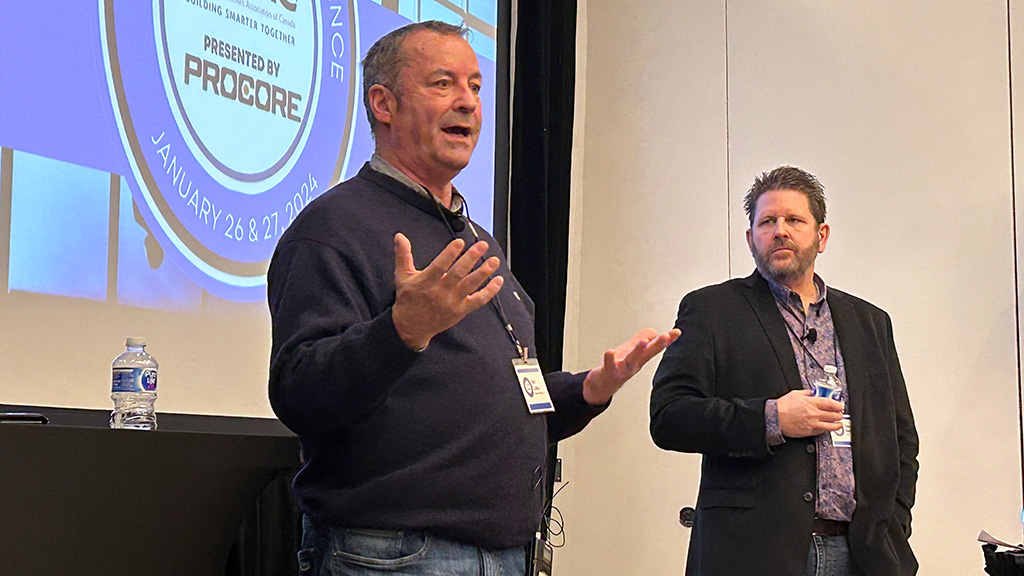When it comes to mitigating and managing construction project risk, there is one simple thing parties can do: read the contract.
That was the advice from Dan Leduc, a partner with Soloway Wright Lawyers, and Doug Baird, senior vice-president of AON, in a panel discussion on how to avoid risk during the Mechanical Contractors Association of Canada’s Emerging Leaders Conference held recently in Toronto.
“You spend a lot of time on the numbers and not a lot of time on the words,” said Leduc. “You’re worried about the selling price instead of the fine print, but how is risk allocated? It’s in that fine print. And why is it in eight font? Because they don’t want you to read it. To me that’s a red flag.”
Although the session was billed How to Avoid Risk, sometimes it can’t be swerved.
“If you wanted to avoid risk, you wouldn’t be in business,” Leduc explained. “So it’s really not how to avoid risk, it’s how to take it, look at how it’s allocated, assess it and then either get insurance for it or deal with it contractually. And if the risks are starting to pile up way too much then maybe you just say ‘not my project’ and move onto the next one.”
When it comes to project insurance, Baird said deductibles are skyrocketing, contracts are getting more and more difficult and construction project risk is being transferred down to general contractors who are then pushing it down to subcontractors.
“Now more than ever contracts certainly are an issue and if your company is not dealing with an insurance broker that understands the construction business and understands contract risks that are being put upon you…you’re going to be in trouble,” he said. “You’re going to be exposing your balance sheet unknowingly and somewhere down the road that’s going hit. I would be very cautious of that. Make sure you interview or have your management team interview your broker. Challenge him a little bit more. Make sure they understand what they are doing to protect you.”
There is significant pressure on the insurance marketplace, especially with regards to water, he added.
“We’re seeing million-dollar deductibles for water damage,” said Baird.
“Water may be a strategy that you as a company can come up with and utilize and sell to the general contractors and the project ownership team. I think it will help a fair bit if it’s relayed back to the insurance people placing the property insurance or the liability insurance for that project. That can certainly help mitigate some of the high deductibles and risk.”
Leduc said contractors are attuned to blindly accepting construction project risk.
“You’ve got to stop simply accepting what’s in that contract, because I can tell you there are cancerous tumours in there that if you sign up for them, I can’t cure your cancer,” he said. “I can only mitigate it a little bit…extend the life of that contract a little bit to help you out.”
Knowing what is in a contract is important and so is asking questions.
“There are 135-word sentences,” he said. “If you don’t understand, ask. The beauty of tender is that you can make the inquiry…‘What does this paragraph mean? What are you trying to communicate?’”
Baird also advised the audience to get a copy of the project insurance.
“If you are signing a contract without knowing what your project insurance is covering you for, what the warranties are, you are just asking for trouble,” he noted.
“If there is a massive claim and you ask for a copy of the policy, you’re never going to get it. You’ve got to ask for it prior to signing the contract.”
In terms of how much insurance you need, every project is different, Baird said.
“We can just tell you the types of losses that are happening, the size, the scope and scale of these losses to try and protect your balance sheet as best you can,” he explained.
A lot of contractors fail because of one bad job, he added.
“Sometimes the best job ever…was the one that you didn’t actually get,” said Baird, adding the job may not be worth it if there is too much risk and not enough reward.
“In today’s market, if you price in everything that is risky, you’re probably not going to get the job…I talk to owners all the time and they say, ‘If we don’t take this job, we don’t have any work for our people.’ Yes, but if you take the job look at all the risk…you won’t be around tomorrow if you have the wrong claim, the wrong insurance clause, the wrong contract clause.”
Follow the author on Twitter @DCN_Angela.







Recent Comments
comments for this post are closed